- Home
- A. G. Riddle
The Solar War (The Long Winter Book 2)
The Solar War (The Long Winter Book 2) Read online
The Solar War
The Long Winter Trilogy, Book Two
A.G. Riddle
Contents
Also by A.G. Riddle
Prologue
Chapter 1
Chapter 2
Chapter 3
Chapter 4
Chapter 5
Chapter 6
Chapter 7
Chapter 8
Chapter 9
Chapter 10
Chapter 11
Chapter 12
Chapter 13
Chapter 14
Chapter 15
Chapter 16
Chapter 17
Chapter 18
Chapter 19
Chapter 20
Chapter 21
Chapter 22
Chapter 23
Chapter 24
Chapter 25
Chapter 26
Chapter 27
Chapter 28
Chapter 29
Chapter 30
Chapter 31
Chapter 32
Chapter 33
Chapter 34
Chapter 35
Chapter 36
Chapter 37
Chapter 38
Chapter 39
Chapter 40
Chapter 41
Chapter 42
Chapter 43
Chapter 44
Chapter 45
Chapter 46
Chapter 47
Chapter 48
Chapter 49
Chapter 50
Chapter 51
Chapter 52
Chapter 53
Chapter 54
Chapter 55
Chapter 56
Chapter 57
Chapter 58
Chapter 59
Chapter 60
Chapter 61
Chapter 62
Chapter 63
Chapter 64
Chapter 65
Chapter 66
Chapter 67
Chapter 68
Chapter 69
Chapter 70
Chapter 71
Chapter 72
Chapter 73
Chapter 74
Chapter 75
Chapter 76
Epilogue
The Lost Colony
Author's Note
Acknowledgments
About the Author
Published in North America by Legion Books.
Published in print in the UK and Commonwealth countries by Head of Zeus.
Copyright © 2019 by A.G. Riddle
all rights reserved.
printed in the united states of america.
The Solar War is a work of fiction. Names, characters, places, events, and incidents are the products of the author’s imagination or are used fictitiously.
No part of this book may be reproduced in any form or by any electronic or mechanical means, including information storage and retrieval systems, without written permission from the author, except for the use of brief quotations in a book review.
isbn 978-1-940026-24-4 (hardcover)
isbn 978-1-940026-25-1 (paperback)
isbn 978-1-940026-23-7 (e-book)
edition 1.1.0
Discover other great authors and their books at:
LegionBooks.com
also by A.G. RIDDLE
The Origin Mystery
The Extinction Files
Departure
see more books by a.g. riddle at:
agriddle.com
Don’t miss A.G. Riddle’s next book.
Join the email list:
agriddle.com/email-list
subscribers also get free books & more.
To those special people who help us weather the worst seasons of our lives.
Prologue
Deep in space, billions of miles from Earth, an ancient machine awoke.
First, it checked its systems.
All were normal.
Then it found the source of its awakening: a message.
Inside the data packet was a simple command. It was a task the machine had completed thousands of times: the annihilation of a primitive civilization.
The machine ran several simulations, quickly settling on the optimal way to eliminate the target. The question wasn’t whether it could wipe out the primitives. It was how to do so with the least amount of energy expenditure. Energy was the most precious resource in the universe. The grid needed the energy from the star in the primitives’ solar system.
It would soon have it.
The machine powered its engines and began moving toward the planet, which the local inhabitants called Earth.
Chapter 1
James
The doctor’s gloves are covered in blood.
The floor is covered in blood.
Emma is squeezing my hand so hard I’m not sure I’ll leave this room with it. She cries out, and I shudder as if a cold wind were blowing across me.
“Can’t you give her something?” I ask the doctor, still wincing.
“It’s too late.” To her, he says, “One last push, Emma.”
She grits her teeth and strains again.
“That’s it,” he coaxes, his hands held out.
Why didn’t she take the epidural? If offered, I would take an epidural at this point.
I’m a medical doctor. I never completed my residency or practiced medicine because I knew robotics and AI were my true calling. With that said, one thing is certain: I’m not tough enough to have been an obstetrician. Moments like this take nerves of steel.
Emma strains again and a cry bellows into the room, loud and clear, the most beautiful sound I’ve ever heard.
The doctor holds the baby up for Emma to see.
Her eyes fill with tears, her chest heaves, and she sinks back to the bed, exhausted. As long as I’ve known her, I’ve never seen her so happy. I’ve never been so happy.
“Congratulations,” the doctor says, “you have a baby girl.”
He hands our child to a waiting team who runs a series of tests.
I lean over and hug Emma, and kiss her on the cheek. “I love you.”
“I love you too,” she whispers.
A nurse lays the child on Emma’s chest, and my wife cradles her closer.
I can see the relief in Emma’s face. She has been terrified that the child would have birth defects from the radiation Emma was exposed to while in space.
Initially, I was concerned as well. But the doctors assured us that the child was fine for several reasons. First, the newer vessels created by NASA are much better shielded against radiation than those created in decades past. Secondly, our daughter was conceived several months after we returned from the Battle of Ceres. Both Emma and I, like all of the returning crew, went through biocontainment when we landed. The process included treatments to improve our bone density and radiation-cleansing therapy.
When we learned Emma was pregnant, Izumi and the other doctors ran every test under the sun and showed us the results. But still Emma worried. Like most first-time parents, we both did. Now it seems they were right. Our daughter is healthy. And so beautiful. We’ve decided to name her after Emma’s mother, Allison.
“Welcome to the world, Allie,” Emma whispers.
A scream echoes in the night. The baby monitor on Emma’s bedside table practically vibrates as it blasts the sound into our bedroom. She rolls over and studies the blue-green night vision image.
Allie lies on her back in the middle of the crib, swaddled tightly. Her face is contorted, mouth open, crying non-stop. It blows my mind that a child so small can make a sound so large.
“I’ve got it,” I mumble as I sit up and throw my le
gs over the side of the bed.
She grabs my arm. “No. You have to work early.”
“True, but I’ve still got this.”
I kiss her on the forehead and pull the covers back up to her chin. She needs to rest.
The last month has been exhausting for both of us, and she has borne the brunt of it. It’s my turn to pick up some slack.
I stumble into the nursery and hoist Allie out of the crib. I hold her tight to my chest and gently rock her as I walk around. Emma is better at this. She has a singsong voice, and she knows exactly what to say. My rendition is like an awkward marionette, trying to soothe the child, saying, “It’s okay... it’s all right.” I don’t even attempt a song.
Oscar appears at the doorway and whispers, “Sir, can I help?”
Oscar has a variety of skills. This is not one of them. I’m not judging. It’s not one of my skills either.
“No, it’s okay.”
I settle into the rocking chair and sway silently, Allie’s blue eyes staring up at me, innocently, maybe a hint of curiosity there. I place my index finger in her small palm and wait. A second later, her tiny fingers wrap around my finger, holding it. I smile and stare in wonder at how little and fragile she is. How innocent she is. And how ruthless and deadly the world out there waiting for her is.
Before Allie was born, I had a laundry list of worries. Now I have one: her. I imagine every parent worries about the world that awaits their child, but the world we have brought Allie into is in crisis, torn between our everyday struggles and preparing for a war we know is coming.
Billions died during an ice age known as the Long Winter. Only nine million of us survived. When the ice spread across the Earth, the survivors flocked to the world’s last habitable regions, setting up sprawling refugee camps. The Long Winter has broken, but we’re still here in the camps, though there’s a growing movement to return to our homelands and start over.
Behind everyday life in the camps looms a threat rarely spoken about but never forgotten: the grid. Some say the alien entity that brought the Long Winter is gone for good. But I can’t take that risk.
If the grid returns, it will be to finish us, to wage a war to end all wars. I’m going to be ready for that war. Because it’s my job. And because I’m a father now.
It’s still dark out when Allie finally surrenders to sleep again. I should go back to bed, but I’m too wound up. Being out of work for a month has been tough for me.
In my small office nook in our habitat, I scan my email messages and open the news feed.
In a video thumbnail, a reporter stands before an expanse of frozen landscape. Two years ago, I would have assumed she was in Antarctica. Now you can’t tell—this is what half the world still looks like. Text at the bottom of the screen reveals the location: Washington, DC.
Behind the reporter, a dozen US Navy helicopters and throngs of troops are congregated around a giant excavator. I click play on the video, and the machine begins digging into the snow, carefully uncovering something.
The reporter’s voice rings out in my tiny office, and I rush to turn the volume down.
“Behind me, American military forces are taking the first step in reopening the American homeland.”
The camera zooms in, revealing the object beneath the snow: the dome of the US Capitol building.
The scene expands to include the reporter once again.
“Ladies and gentlemen, we’re going home.”
Another video catches my eye, one I don’t want to watch and can’t help but watch.
The opening sequence is a wall of snow slowly melting to reveal the show’s logo, Melting Point with Craig Collins.
Melting Point is one of the most popular news programs on AtlanticNet, one of only a handful that are syndicated around the world thanks to recently launched satellites.
“My guest this hour is acclaimed robotics expert Dr. Richard Chandler. He’s here to talk about his new book, Saving Earth: The Real Story Behind NASA’s Desperate Mission to End the Long Winter.”
The screen changes to a view of the book cover, and then fades back to Craig and Chandler sitting around a small table.
“Thank you for being here, Dr. Chandler.”
My former university professor and mentor, and later nemesis, smiles like a Cheshire cat. “My pleasure.”
“Let’s start with your book. Everyone’s talking about it. It’s been read—what—a million times on the net?”
“At least. I’m not really sure. I don’t pay attention to those types of things. I just want to get the word out.”
“Well, at least a few people have taken issue with some of those words. I’m talking specifically about your claims regarding the first contact mission and the Battle of Ceres. Your account has been disputed by NASA and officials from the three superpowers.”
Chandler shrugs, apparently unbothered. “They have every incentive to dispute the claims. They want to be the sole source of the truth. It’s the only way they can ensure that they stay in power. But as the ice melts, so does their grip on the world’s population. Their focus is the Solar Shield project, but the reality is that we need a balanced approach to defending Earth and more of a focus on what the people need.”
“Which is?”
“To go home. To the cities and houses we left. For life to get back to normal. That’s what people want—and what the three major governments fear most.”
“Let’s get back to the book for a moment. In it, you say that you were a central part of the planning and execution of the first contact mission as well as the Battle of Ceres where we defeated the grid. And now you claim you’re being excluded from any further missions and planning. But the generally accepted history is that James Sinclair was the lead scientist and roboticist on the mission. How do you reconcile those two accounts?”
“I would encourage viewers to look at the undeniable facts. No one at NASA can deny that I was the first roboticist contacted about the mission. No one can deny that I was at the Kennedy Space Center when the crew was brought together and briefed. Yes, Sinclair was on the Pax and in the Spartan fleet. I remained here on Earth in a planning capacity—for good reason. You don’t put your greatest minds in harm’s way. We knew the missions were extraordinarily dangerous. We needed to plan for the future.”
Chandler pauses, seeming pained about what he’s about to say. “I would also encourage viewers to look at the source. Perhaps the only fact that no one can deny is that James Sinclair is a convicted felon. Before the Long Winter, the United States government deemed him a risk to public safety. They imprisoned him. And that’s precisely where he was when the first contact mission was being planned—in prison. He was offered a conditional pardon in return for his service aboard the spaceships.”
Chandler nods diplomatically. “With that said, I’m willing to give credit where credit is due. Sinclair did some good work during the two space missions. But do we really want a convicted felon like Sinclair leading our efforts to defend Earth? We need a different kind of person in charge. One who has shown a history of acting in the public’s interest—not their own.”
This has been going on for months now—Chandler bashing me. Spewing half-truths and self-aggrandizement. It’s true, he was at the initial meeting at NASA before the first contact mission launched. But his plans for the robotics part of the mission would’ve severely limited our chances of success. I challenged him on it, and when Chandler became combative, Dr. Lawrence Fowler, the director of NASA, removed him from the mission. Looking back, pulling Chandler from the crew probably saved the mission. Might have saved the world.
I can’t look any more. I shouldn’t have opened the video in the first place. But I know deep down that if public sentiment turns against the government, we won’t just be fighting the grid, we’ll be fighting amongst ourselves. We can’t afford that.
Chapter 2
James
Outside the habitat, I march toward the hard-packed street, my feet cru
nching in the sludge of melting snow and loose sand.
Here in Camp Seven, in what used to be Northern Tunisia, the sun is peeking above the horizon, spewing hazy yellow light on the white, domed habitats that line the streets like melted marshmallows sticking out of the sand.
On mornings like this, when the sun we have always known shines brightly, it’s easy to see how people might think we’re safe. To think everyone can just go back to their homeland and everything will be normal. But what’s normal anymore? Do the banks and other companies that had existed before the Long Winter still exist? What of the mortgages they held on people’s homes? And credit card debt? And even bank accounts? Are there even any records left?

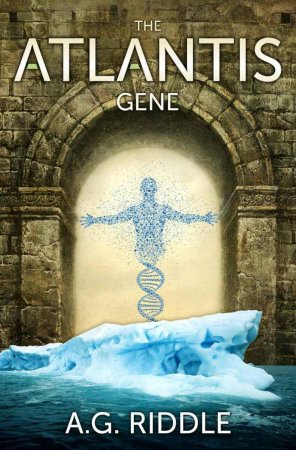 The Atlantis Gene: A Thriller
The Atlantis Gene: A Thriller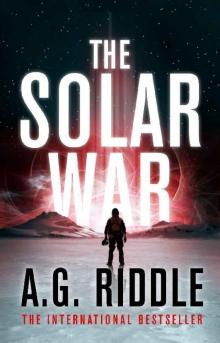 The Solar War (The Long Winter Book 2)
The Solar War (The Long Winter Book 2) The Extinction Files Box Set
The Extinction Files Box Set The Atlantis Trilogy Box Set- The Complete Series
The Atlantis Trilogy Box Set- The Complete Series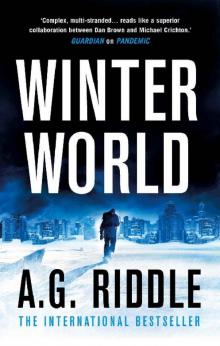 Winter World
Winter World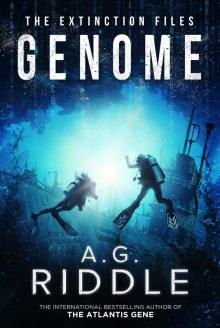 Genome
Genome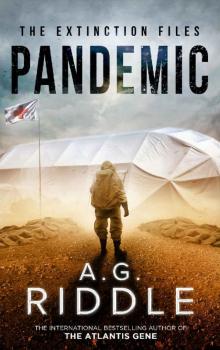 Pandemic (The Extinction Files Book 1)
Pandemic (The Extinction Files Book 1) The Atlantis Gene: A Thriller (The Origin Mystery, Book 1)
The Atlantis Gene: A Thriller (The Origin Mystery, Book 1) Departure
Departure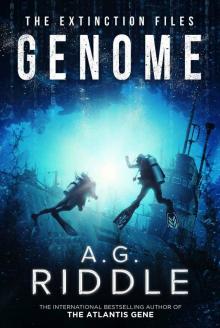 Genome (The Extinction Files Book 2)
Genome (The Extinction Files Book 2)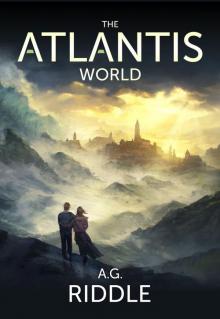 The Atlantis World (The Origin Mystery, Book 3)
The Atlantis World (The Origin Mystery, Book 3) The Atlantis Plague: A Thriller (The Origin Mystery, Book 2)
The Atlantis Plague: A Thriller (The Origin Mystery, Book 2)